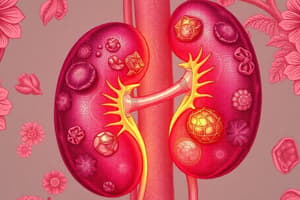Podcast
Questions and Answers
Which of the following is the immediate objective of treatment for renal or ureteral colic?
Which of the following is the immediate objective of treatment for renal or ureteral colic?
- To prevent nephron destruction
- To relieve the pain (correct)
- To determine the stone type
- To eradicate the stone
What is the role of nonsteroidal anti-inflammatory drugs (NSAIDs) in treating renal calculus pain?
What is the role of nonsteroidal anti-inflammatory drugs (NSAIDs) in treating renal calculus pain?
- To prevent nephron destruction
- To determine the stone type
- To provide pain relief and reduce swelling (correct)
- To eradicate the stone
What is the recommended fluid intake for patients with renal calculi?
What is the recommended fluid intake for patients with renal calculi?
- Four to six 8-oz glasses of water daily
- Eight to ten 8-oz glasses of water daily (correct)
- Ten to twelve 8-oz glasses of water daily
- Six to eight 8-oz glasses of water daily
What is the mainstay of most medical therapy for renal calculi?
What is the mainstay of most medical therapy for renal calculi?
What is the recommended urine output for patients with renal calculi?
What is the recommended urine output for patients with renal calculi?
What is the dietary recommendation for patients with calcium stones?
What is the dietary recommendation for patients with calcium stones?
What foods should be limited in a low-purine diet for patients with uric acid stones?
What foods should be limited in a low-purine diet for patients with uric acid stones?
Which of the following is a potential complication of surgical management for kidney stones?
Which of the following is a potential complication of surgical management for kidney stones?
What is the purpose of straining all urine after ESWL?
What is the purpose of straining all urine after ESWL?
What is the method where an electrical discharge creates a hydraulic shock wave to break up a kidney stone?
What is the method where an electrical discharge creates a hydraulic shock wave to break up a kidney stone?
When is chemolysis used as a treatment for kidney stones?
When is chemolysis used as a treatment for kidney stones?
What are the alternative treatment modalities used in combination for kidney stone removal?
What are the alternative treatment modalities used in combination for kidney stone removal?
What is the expected duration of passage of stone fragments after undergoing ESWL?
What is the expected duration of passage of stone fragments after undergoing ESWL?
What should a patient with a stent in the ureter expect regarding hematuria?
What should a patient with a stent in the ureter expect regarding hematuria?
Which of the following is the main reason why the patient with renal calculi needs to understand the signs and symptoms of stone formation, obstruction, and infection?
Which of the following is the main reason why the patient with renal calculi needs to understand the signs and symptoms of stone formation, obstruction, and infection?
What does the nurse need to assess during follow-up visits for a patient with renal calculi?
What does the nurse need to assess during follow-up visits for a patient with renal calculi?
If medications are prescribed for the prevention of stone formation, what does the nurse explain to the patient?
If medications are prescribed for the prevention of stone formation, what does the nurse explain to the patient?
Why is it important for the patient with renal calculi to understand the signs and symptoms of stone formation, obstruction, and infection?
Why is it important for the patient with renal calculi to understand the signs and symptoms of stone formation, obstruction, and infection?
What is the main purpose of assessing the patient's ability to monitor urinary pH and interpret the results during follow-up visits?
What is the main purpose of assessing the patient's ability to monitor urinary pH and interpret the results during follow-up visits?
If medications are prescribed for the prevention of stone formation, what information does the nurse provide to the patient?
If medications are prescribed for the prevention of stone formation, what information does the nurse provide to the patient?
What is the purpose of understanding the signs and symptoms of stone formation, obstruction, and infection for a patient with renal calculi?
What is the purpose of understanding the signs and symptoms of stone formation, obstruction, and infection for a patient with renal calculi?
What does the nurse need to assess during follow-up visits for a patient with renal calculi?
What does the nurse need to assess during follow-up visits for a patient with renal calculi?
If medications are prescribed for the prevention of stone formation, what information does the nurse provide to the patient?
If medications are prescribed for the prevention of stone formation, what information does the nurse provide to the patient?
Which procedure is used to remove stones from the ureter?
Which procedure is used to remove stones from the ureter?
What procedure is used to remove stones from the bladder?
What procedure is used to remove stones from the bladder?
What is the procedure called when a stone in the bladder is crushed using an instrument inserted through the urethra?
What is the procedure called when a stone in the bladder is crushed using an instrument inserted through the urethra?
What are the signs and symptoms of a urinary tract infection (UTI)?
What are the signs and symptoms of a urinary tract infection (UTI)?
What are the signs and symptoms of urinary tract obstruction?
What are the signs and symptoms of urinary tract obstruction?
What should be done with the patient's urine to check for stones or gravel?
What should be done with the patient's urine to check for stones or gravel?
What are the potential complications of kidney stones?
What are the potential complications of kidney stones?
Flashcards are hidden until you start studying




